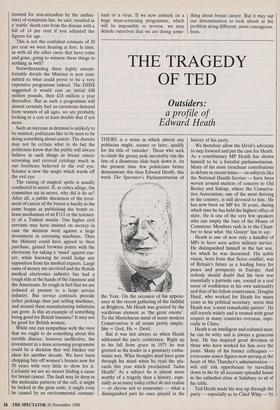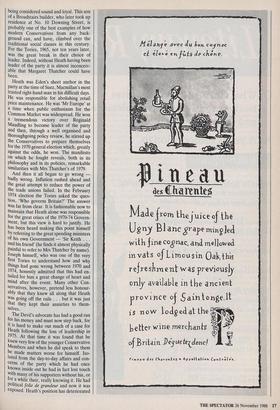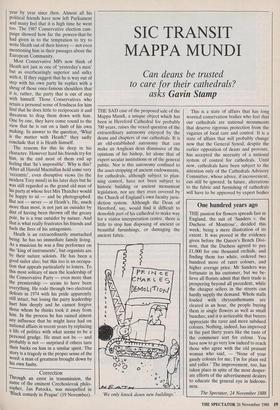THE TRAGEDY OF TED
Outsiders: a profile of Edward Heath
THERE is a sense in which almost any politician might, sooner or later, qualify for the title of 'outsider'. Those who seek to climb the greasy pole inevitably run the fate of a disastrous slide back down it. At the present time few politicians better demonstrate this than Edward Heath, this week The Spectator's Parliamentarian of the Year. On the occasion of his appear- ance at the recent gathering of the faithful at Brighton, Mr Heath was greeted by the vociferous element as 'the great enemy'. To the Manichaean mind of many modern Conservatives it all seems pretty simple: She = God, He = Devil.
But it was not always so when Heath addressed the party conference. Right up to his fall from grace in 1975 he was greeted as the leader in a genuinely enthu- siastic way. What thoughts must have gone through his mind when he read the pla- cards this year which proclaimed 'Judas Heath!' As a subject he is almost more worthy of a tragedy than a history, espe- cially as so many today either do not realise — or choose not to remember — what a distinguished part he once played in the history of his party.
We therefore allow the Devil's advocate to step forward and put the case for Heath. As a •constituency MP Heath has shown himself to be a forceful parliamentarian. Many of his most trenchant contributions in debate in recent times—on subjects like the National Health Service — have been woven around matters of concern to Old Bexley and Sidcup, where the Conserva- tive Association, one of the most thriving in the country, is still devoted to him. He has now been an MP for 38 years, during which time he has held the highest office of state. He is one of the very few speakers who can empty the bars of the House of Commons: Members rush in to the Cham- ber to hear what 'the Grocer' has to say.
Heath is one of now only a handful of MPs to have seen active military service. He distinguished himself in the last war, for which he was decorated. His noble vision, born from that fierce conflict, was of Britain's future as a leading force for peace and prosperity in Europe. And nobody should doubt that his view was essentially a patriotic one, rooted in a real sense of confidence in his own nationality and that of his fellow countrymen. Douglas Hurd, who worked for Heath for many years as his political secretary, wrote that Heath was 'a most remarkable patriot'. He still travels widely and is treated with great respect in many countries overseas, espe- cially in China.
Heath is an intelligent and cultured man; he can be witty and is always a generous host. He has inspired great devotion in those who have worked for him over the years. Many of his former colleagues even some senior figures now serving at the heart of Mrs Thatcher's administration will still risk opprobrium by travelling down to his by all accounts splendid house in the cathedral close at Salisbury to sit at his table.
Ted Heath made his way up through the party — especially as its Chief Whip — by being considered sound and loyal. This son of a Broadstairs builder, who later took up residence at No. 10 Downing Street, is probably one of the best examples of how modern Conservatives from any back- ground can, and have, climbed over the traditional social classes in this century. For the Tories, 1965, not ten years later, was the great break in their choice of leader. Indeed, without Heath having been leader of the party it is almost inconceiv- able that Margaret Thatcher could have been.
Heath was Eden's sheet anchor in the party at the time of Suez, Macmillan's most trusted right-hand man in his difficult days. He was responsible for abolishing retail price maintenance. He was 'Mr Europe' at a time when public enthusiasm for the Common Market was widespread. He won a tremendous victory over Reginald Maudling to become leader of the party and then, through a well organised and thoroughgoing policy review, he stirred up the Conservatives to prepare themselves for the 1970 general election which, greatly against the odds, he won. The manifesto on which he fought reveals, both in its philosophy and in its policies, remarkable similarities with Mrs Thatcher's of 1979. And then it all began to go wrong — badly wrong. Inflation rushed ahead and the great attempt to reduce the power of the trade unions failed. In the February 1974 election the Tories asked the ques- tion, 'Who governs Britain?' The answer was far from clear. It is fashionable now to maintain that Heath alone was responsible for the great crises of the 1970-74 Govern- ment, but this view is hard to justify. He has been heard making this point himself by referring to the great spending ministers of his own Government — 'Sir Keith . . . and his friend' (he finds it almost physically painful to refer to Mrs Thatcher by name). Joseph himself, who was one of the very first Tories to understand how and why things had gone wrong between 1970 and 1974, honestly admitted that this had en- tailed for him a great change of heart and mind after the event. Many other Con- servatives, however, pretend less honour- ably that they knew all along that Heath was going off the rails . . . but it was just that they kept their anxieties to them- selves.
The Devil's advocate has had a good run for his money and must now step back, for it is hard to make out much of a case for Heath following the loss of leadership in 1975. At that time it was found that he knew very few of the younger Conservative Members and when he did speak to them he made matters worse for himself. Iso- lated from the day-to-day affairs and con- cerns of the party which he had once known inside out he had in fact lost touch with many of his supporters without his, or fora while their, really knowing it. He had political folie de grandeur and now it was exposed. Heath's position has deteriorated year by year since then. Almost all his political friends have now left Parliament and many feel that it is high time he went too. The 1987 Conservative election cam- paign showed how far the powers-that-be had given in to the temptation to try to write Heath out of their history — not even mentioning him in their passages about the European Community.
Most Conservative MPs now think of Heath not just as one of 'yesterday's men' but as overbearingly superior and sulky with it. If they suggest that he is way out of step with his own party he replies with a shrug of those once-famous shoulders that it is, rather, the party that is out of step with himself. Those Conservatives who retain a personal sense of fondness for him find that he does little to reciprocate it and threatens to drag them down with him. One by one, they have come round to the view that he is out on a limb of his own making. In answer to the question, 'What is the matter with Heath?' they sadly conclude that it is Heath himself.
The reasons for this lie deep in his character. However hard his friends try for him, in the end most of them end up feeling that 'he's impossible'. Why is this? After all Harold Macmillan held some very `eccentric', even disruptive views (to the modern Tory mind) in his later days but he was still regarded as the grand old man of his party at whose feet Mrs Thatcher would be happy to sit — and be photographed. But not — never — at Heath's. He, much more than most, is not just an outsider by dint of having been thrown off the greasy pole, he is a true outsider by nature. And that is what really frustrates his friends and fuels the fires of his antagonists.
Heath is an extraordinarily unattached being: he has no immediate family living. As a musician he was a fine performer on the 'king of instruments', but organists are by their nature soloists. He has been a good sailor also; but this too is an occupa- tion that appeals particularly to loners. To this most solitary of men the leadership of the Conservative Party — even more than the premiership — seems to have been everything. He rode through two electoral defeats in 1974 with his pride apparently still intact, but losing the party leadership hurt him deeply and he cannot forgive those whom he thinks took it away from him. In the process he has ruined almost any influence that he might have had on national affairs in recent years by replacing a life of politics with what seems to be a Personal grudge. He must not be — and probably is not — surprised if others turn their backs on him in a similar spirit. The story is a tragedy in the proper sense of the word: a man of greatness brought down by his own faults.












































































 Previous page
Previous page